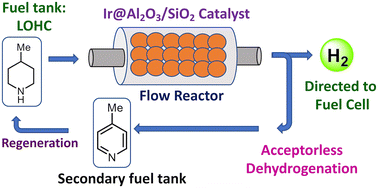Acceptorless dehydrogenation of 4-methylpiperidine by supported pincer-ligated iridium catalysts in continuous flow†
Abstract
Finding alternative and sustainable ways to produce, store and convert energy is key for reducing fossil fuel-based CO2 emissions. In this transformation, hydrogen for energy storage and hydrogen-powered fuel cells for energy conversion can play important roles. However, storage of hydrogen itself is difficult and the concept of reversible liquid organic hydrogen carriers (LOHCs) has been proposed given the advantages of using liquid storage materials. A key part in the adaption of LOHCs is the catalyst design for efficient dehydrogenation of these hydrogen-carrying species. In this study, the use of silica- and alumina-supported POCOP–Ir systems for gas phase acceptorless dehydrogenation of 4-methylpiperidine (an LOHC with 6.1 wt% hydrogen) is investigated in a continuous-flow system with a high TON. To increase stability and reactivity, a new POCOP–Ir complex with two anchors was designed and found to be highly active in the dehydrogenation of 4-methylpiperidine with ∼91 000 turnovers in 45 h. In addition, this catalyst showed a maintained activity with a TOF of 1684 h−1 after 45 h.

- This article is part of the themed collection: Catalysis Science & Technology Most Popular 2023 Articles


 Please wait while we load your content...
Please wait while we load your content...